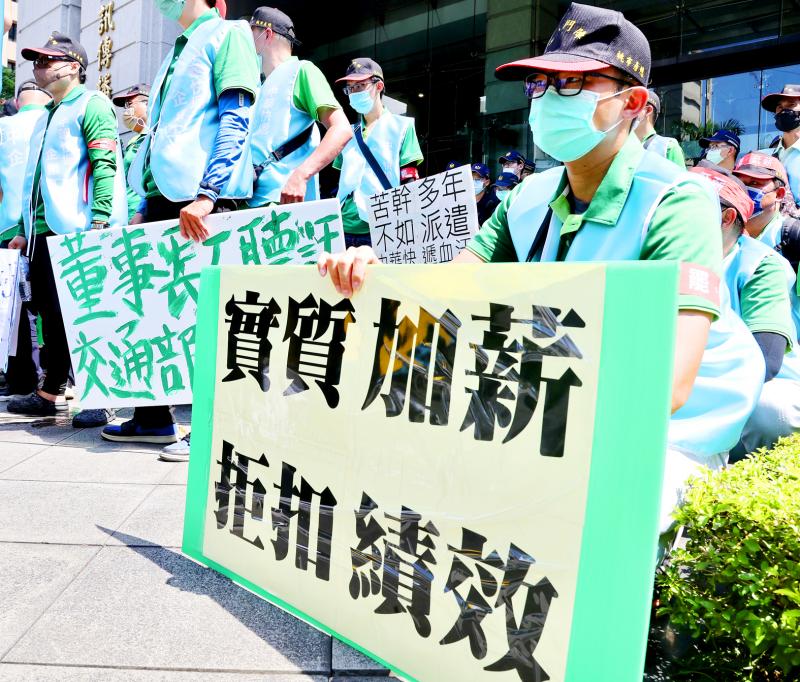The Chunghwa Express Workers’ Union canceled a strike scheduled for today after the company agreed to all of its demands following a two-hour meeting yesterday afternoon.
In addition to a NT$5,000 raise for all entry-level employees, the union had demanded that performance-based bonuses this year not be lower than the average bonuses for 2020 and last year.
Meanwhile, the company must not retaliate against union members for organizing a strike or workers’ events, the union said, adding that wages of workers who went on strike last week would be determined in a meeting today.

Photo: CNA
Chunghwa Post Co’s salary adjustment mechanism would be used as reference when a similar system is being set up at the delivery firm, the union said.
Negotiations over such a system should be conducted within a month between representatives from Chunghwa Express, the Taiwan Automobile Freight and Warehousing Association, and Chunghwa Post’s board of directors.
Chunghwa Express chairman Huang Cheng-chung (黃政忠) and union chairman Chen Hung-chuen (陳宏春) signed a document agreeing to the demands. The two and other union members are to meet with Chunghwa Post president Chiang Rui-tang (江瑞堂) at 10am today for final confirmation of the agreement.
About 100 union members protested at the Ministry of Transportation and Communications in Taipei for a third time yesterday afternoon, after Minister of Transportation and Communications Wang Kwo-tsai (王國材) on Wednesday voiced support for a salary increase for Chunghwa Express employees, which he said seemed reasonable.
“Our job is to deliver bills of exchange, promissory notes and checks issued by banks, which is key in maintaining order in the financial sector,” the union said. “However, it is difficult to make a living or support a family with the monthly salary we are paid.”
“We are only asking Chunghwa Express to use a portion of its annual profits to improve workers’ wages,” it said.
The one-day strike on Monday last week was meant to be a warning, the union said, adding that it suspended the strike after Wang voiced his support for a salary adjustment.
During negotiations on Tuesday and Wednesday last week, the company’s management only agreed to propose a NT$5,000 raise for all employees at an interim board meeting on Thursday next week, but did not promise that the salary adjustment would not reduce their performance-based bonuses and annual incomes, the union said.
On Friday, 74.1 percent of union members voted to go on a second strike if management was not committed to fulfilling the pledges.
Chunghwa Post holds about a 40 percent stake in Chunghwa Express and controls five of 13 seats on the delivery firm’s board. The rest of the seats are controlled by China Airlines, Eva Airways, HCT Logistics Co, Kerry TJ Logistics Co and four other private investors.
Although the ministry, which owns Chunghwa Post, supports a raise for Chunghwa Express workers, not all private investors have agreed to the union’s demands, a source familiar with the matter said.

Alain Robert, known as the "French Spider-Man," praised Alex Honnold as exceptionally well-prepared after the US climber completed a free solo ascent of Taipei 101 yesterday. Robert said Honnold's ascent of the 508m-tall skyscraper in just more than one-and-a-half hours without using safety ropes or equipment was a remarkable achievement. "This is my life," he said in an interview conducted in French, adding that he liked the feeling of being "on the edge of danger." The 63-year-old Frenchman climbed Taipei 101 using ropes in December 2004, taking about four hours to reach the top. On a one-to-10 scale of difficulty, Robert said Taipei 101

Taiwanese and US defense groups are collaborating to introduce deployable, semi-autonomous manufacturing systems for drones and components in a boost to the nation’s supply chain resilience. Taiwan’s G-Tech Optroelectronics Corp subsidiary GTOC and the US’ Aerkomm Inc on Friday announced an agreement with fellow US-based Firestorm Lab to adopt the latter’s xCell, a technology featuring 3D printers fitted in 6.1m container units. The systems enable aerial platforms and parts to be produced in high volumes from dispersed nodes capable of rapid redeployment, to minimize the risk of enemy strikes and to meet field requirements, they said. Firestorm chief technology officer Ian Muceus said

MORE FALL: An investigation into one of Xi’s key cronies, part of a broader ‘anti-corruption’ drive, indicates that he might have a deep distrust in the military, an expert said China’s latest military purge underscores systemic risks in its shift from collective leadership to sole rule under Chinese President Xi Jinping (習近平), and could disrupt its chain of command and military capabilities, a national security official said yesterday. If decisionmaking within the Chinese Communist Party has become “irrational” under one-man rule, the Taiwan Strait and the regional situation must be approached with extreme caution, given unforeseen risks, they added. The anonymous official made the remarks as China’s Central Military Commission Vice Chairman Zhang Youxia (張又俠) and Joint Staff Department Chief of Staff Liu Zhenli (劉振立) were reportedly being investigated for suspected “serious

American climber Alex Honnold is to attempt a free climb of Taipei 101 today at 9am, with traffic closures around the skyscraper. To accommodate the climb attempt and filming, the Taipei Department of Transportation said traffic controls would be enforced around the Taipei 101 area. If weather conditions delay the climb, the restrictions would be pushed back to tomorrow. Traffic controls would be in place today from 7am to 11am around the Taipei 101 area, the department said. Songzhi Road would be fully closed in both directions between Songlian Road and Xinyi Road Sec 5, it said, adding that bidirectional traffic controls would